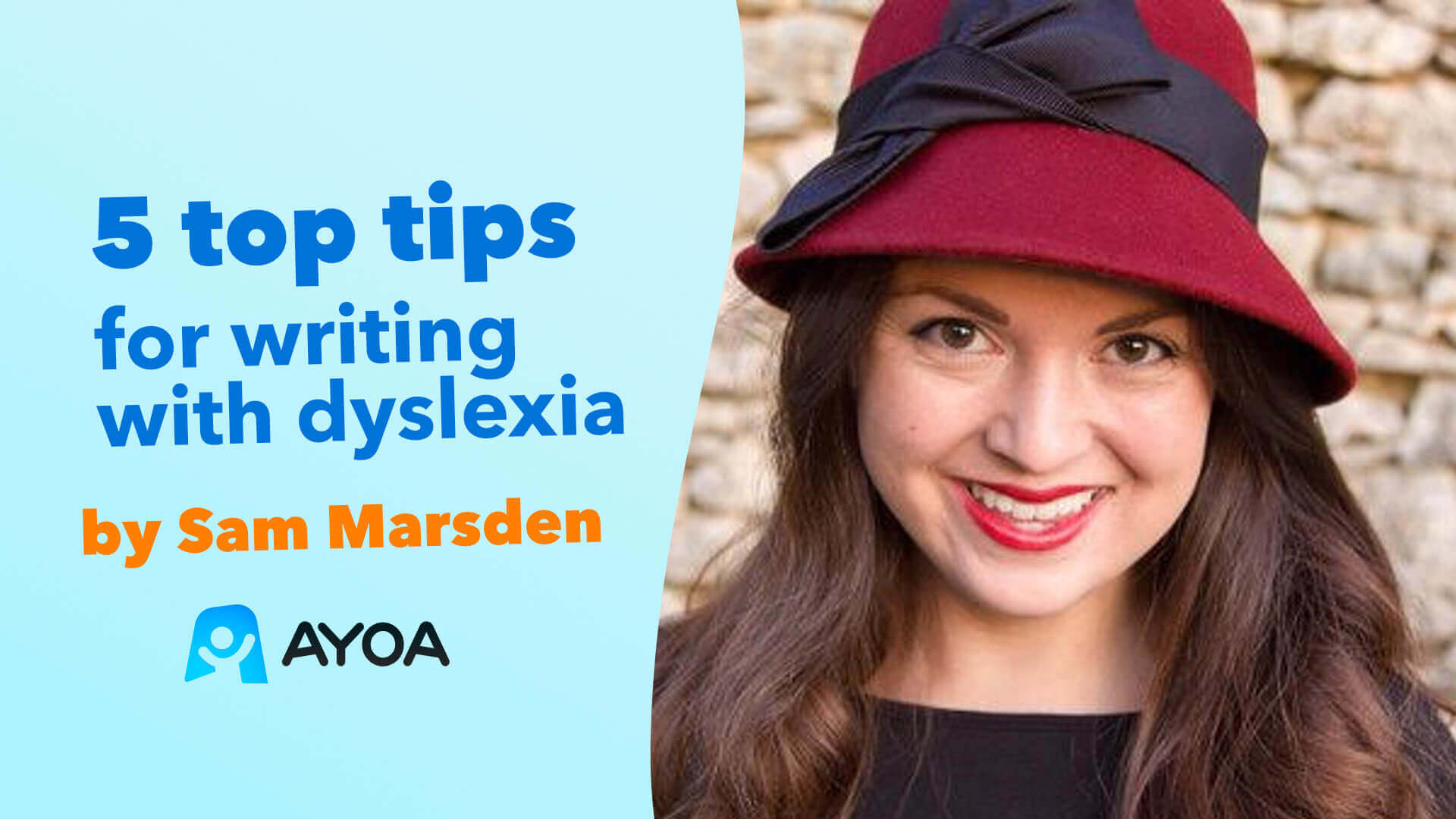To celebrate World Book Day, we caught up with author and writer, Sam Marsden. Sam is a full-time writer with dyslexia and is the author of the #1 Amazon category bestseller, ‘100 Acting Exercises for 8-18 Year Olds’. She shares with us her journey to becoming a writer, plus her top five tips for dyslexic writers to embrace their gifts and improve their skills!
My journey to becoming a writer
When I was seven I was diagnosed with dyslexia and unfortunately, for a long time, I believed I was stupid. I struggled at primary and secondary school and found many teachers tried to make me fit into a way of thinking that didn’t work for me. When I graduated from university with a first-class honour’s degree, it got me questioning my pre-existing belief that I wasn’t clever enough for academic subjects. With some outstanding teachers at university, I discovered my strengths, which include big-picture thinking, creating new ideas, debating, and problem solving. I think these strengths are linked to my dyslexia.
Now, as a full-time writer, I still struggle to spell correctly and organize my ideas. But this doesn’t matter too much as I have learnt storytelling, fresh ideas, and an open mind are the most important qualities of being a writer. People with dyslexia are masters at creating something original out of nothing, which is the ultimate super-power when you’re a writer!
My top 5 writing tips
Set aside a time to write and show up every day
The more you write, the stronger your writing will get. If you were to run a marathon you’d need to train, and the same goes for writing. The more you flex your writing muscle, the stronger it gets. Every day between the hours of 5.30 am – 7.30 am, I write. The key is to turn up to the blank page every day and fill it with words. Unfortunately, people with dyslexia are likely to have had harmful things said to them about their reading and writing ability; block these thoughts out as you create.
Turn spell check off
If you’re writing into a word processor, turn off the spell check as those red squiggly lines illuminating your mistakes can bring you down. Only turn spellcheck on if you’re actively spell checking your work. I recommend doing this at a separate time from creating.
Break tasks into small manageable chunks
Having dyslexia means it can be easy to get overwhelmed and spiral into chaos. Break writing tasks up into small chunks so that you can handle them. For example, when I’m working on a novel, I break the process up into many small manageable tasks and put them into a timetable.
Read a lot
To write well you have to read a lot, which can be tricky when you have dyslexia. For me, reading can be very slow and tiring. I find listening to audiobooks has been wonderful and less of a strain. Also, I’ve discovered kindle has a font for people with dyslexia, which I’ve found easier on the eye.
Remember your gifts
People with dyslexia have many strengths when it comes to writing and don’t forget this! Being able to tell a good story, and to tell it well, is a rare gift and something people with dyslexia are often good at. Don’t let spelling, grammar, or punctuation get in the way of your writing. Small mistakes can all be fixed, perhaps with software or a proof-reader. Writing is bigger and more important than spelling, so don’t let mistakes bring down your imagination or ideas. When you have dyslexia it’s likely you are very visual and will be able to design the most spectacular fictional worlds! It’s also likely you’ll have the ability to see the big picture, so embrace your gifts and exercise them so they can grow.
Dyslexia is not a barrier into the industry
When a publisher was interested in my book 100 Acting Exercises for 8 – 18 Year Olds I kept it a secret that I had dyslexia until after I signed with them. I thought the publisher may reject the project if they knew I had dyslexia. I was wrong. After I signed I told my editor about my dyslexia she said they publish many dyslexic writers, and that my dyslexia wouldn’t have influenced their decision to publish me. Likewise, the editor at The Stage, and my literary agent, have all been very supportive of my dyslexia. I think there is a misconception out there that the publishing industry rejects writers with dyslexia – this has not been my experience. Dyslexia is not a barrier to becoming a writer, it’s just something to be worked with.
In my mid-twenties, when I was playing with the idea of pursuing my dream of becoming a writer, I found out Agatha Christie had dyslexia. She is the best-selling author of all time, so if she can write all those books with dyslexia, then so can we!
My favourite books
To celebrate World Book Day, I’ve been asked to share my favourite book. I can’t choose one, so here’s a few!
-
The Book Thief
-
The Perks of Being a Wallflower
-
I Know Why the Caged Bird Sings
-
The Famished Road
-
Remains of the Day
-
Never Let Me Go
-
The Hunger Games
-
The Song of Achilles
[author_custom name=”Sam Marsden” job=”Author and writer” description=”Sam Marsden has dyslexia and is a full-time writer. She writes for The Stage newspaper and she’s the author of the #1 Amazon category bestseller, ‘100 Acting Exercises for 8-18 Year Olds’, which is published by Bloomsbury Academic/Methuen Drama. Her debut novel, ‘Under Glass’, was optioned for film and TV by former Warner Bros. President of Film Greg Silverman’s Stampede Ventures.” image=”/wp-content/uploads/2021/03/Sam-Marsden.png”]
Interested in discovering more about dyslexia and the support you can receive? Please visit our dyslexia page for more information and resources.


